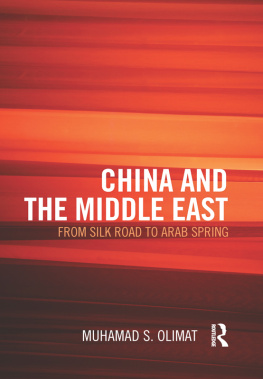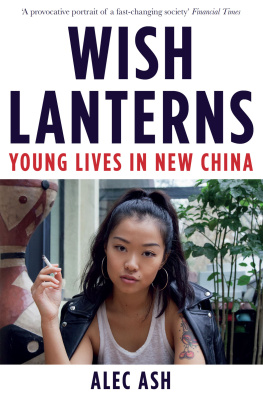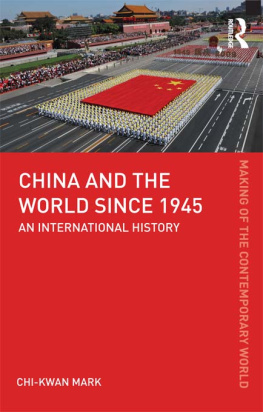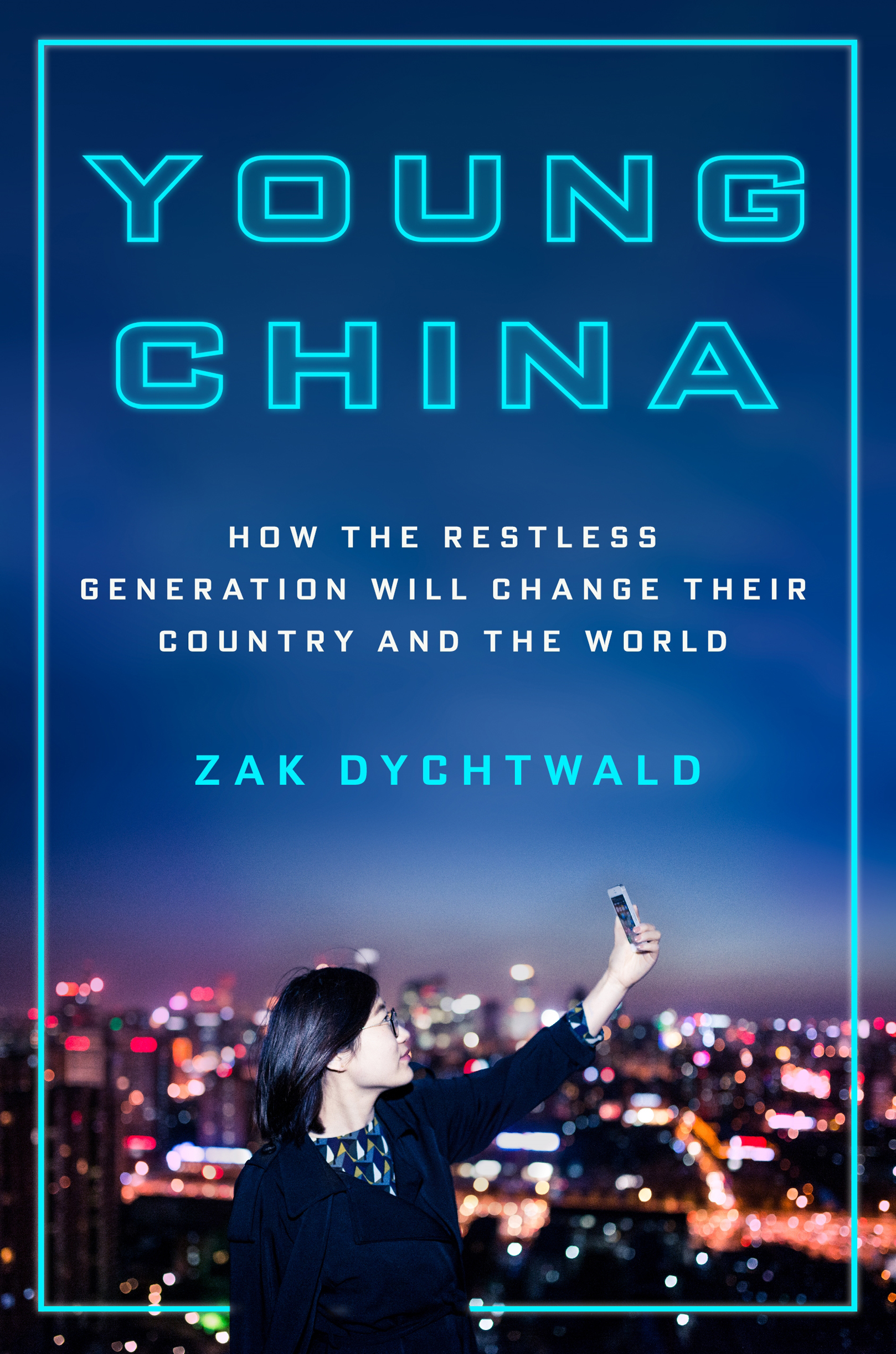Contents
Guide
Pagebreaks of the print version

The author and publisher have provided this e-book to you for your personal use only. You may not make this e-book publicly available in any way. Copyright infringement is against the law. If you believe the copy of this e-book you are reading infringes on the authors copyright, please notify the publisher at: us.macmillanusa.com/piracy.
FOR MY MOM, DAD, AND SISTER
j u l ng h u , n. : The generation China calls post-90s. Sometimes called the Net Generation, Me Generation, or Strawberry Generation for its members inability to eat bitter.
When Philip, my Chinese godfather, heard I was planning to take the train to Shenzhen, he wrote me a note. This was not the first note hed written me. After we first met, he wrote to say he had marked my birthday on his calendar. Weeks later he wrote to remind me to get a flu shot. Soon he sent another note, this time to suggest that I ought to more seriously consider the merits of bok choy as a source of vitamins to supplement my student diet. He once wrote me a beautiful note that said he would be honored if I met his grandson.
This latest note, however, was a warning about Shenzhen, the Chinese metropolis across the border from Hong Kong. I had told him I planned to travel to Shenzhen alone later that day. Philip cautioned me against three things. The first two were pickpockets and counterfeit goods, which might complicate my return to Hong Kong from China. The third was this:
You must not pick up any hookers from the street. Not only are you running the risk of catching a disease and being robbed, they are also likely to steal your internal organs.
Sincerely,
Philip, Your Chinese Godfather
I ended up in Hong Kong by something of a fluke. Columbia University has strict requirements around language proficiency that determine to which countries you may go to study. Hong Kong was a linguistic loophole. Because I had taken a semester of Mandarin during my freshman year, I was eligible to apply to the University of Hong Kong. At the time Id never been to Asia. Despite my bad experience with MandarinI spent more time on that one class than I did on all my others and still got my worst grade in collegeI wanted to see the place where everyone told me the future was happening.
But within weeks of arriving I had begun to find Hong Kong disappointingly manageable, something like a showroom for the rest of China. Hong Kong had been a British colony for more than a century before it was legally returned to China in 1997. People spoke English. Many were proud of their Westernization. Before I went, everyone had told me that the future was in China, but all my professors in Hong Kong seemed to be saying that Hong Kong was not China.
Just across the border was Shenzhen, the real China. The city had once been a collection of fishing villages, thirty thousand people living at the mouth of the Pearl River delta. During Maos rule, the area was deliberately left undeveloped as a buffer zone between Communist China and then-capitalist Hong Kong. During the 1960s, the middle of Maos rule, Philips family risked death to slip past the border patrol into Hong Kongs New Territories and make a better life for themselves in the Pearl of the Orient, as Hong Kong was known. Philip was only a boy.
Two years after Mao died in 1976, China opened its doors to the world and its money. My economics professor at the University of Hong Kong put it this way: Shenzhens Special Economic Zone became the testing ground for all of Chinas economic experiments. Most of them worked. Shenzhens population swelled to twelve million, four hundred times what it had been a few decades earlier. The area was transformed from a southern backwater into the fourth-largest urban economy in China and twenty-third largest in the world, earning the nickname the Overnight City. The joke went that Shenzhen University does not have a history department; the city only looked forward. Although I had great respect for Philip, I was not going to be deterred from seeing Chinas boom city.
The train from Hong Kong to Shenzhen looked like a typical subway lineplastic seats and metal handrails. The people in suits were doing their daily commute across the border. The man next to me held two big cartons of milk in a bag on his lap. He told me that because mainland milk was poisoned, people would pay top dollar for Hong Kong dairy. The woman sitting across from me motioned to her child to stop staring. I waved, the girl laughed, and an hour passed.
When we arrived, we were separated into lines for foreigners, mainlanders, and Hong Kongers, who still need a visa to get into the mainland. I was stamped through and swept out into Shenzhen Luohu Railway Station, which sees eight million border crossers a year.
As soon as I walked out through the doors of the customhouse, I was slammed by a deluge of noise. Salespeople hawking everything from fruit to suits to consultations on international shipping logistics to factory space by the square meter rushed travelers at the doorway. A handful of dedicated milk dealers immediately swallowed the man who had sat next to me; then he rushed out of the pack with a few bills scrunched in his hand. The churn of life was dizzying. I saw signs in English, and tried asking for directions in English, but no one spoke it, unlike in Hong Kong. I tried calling the hostel I had booked, but my phone didnt work in the mainland. I tried to buy a Coke so I could sit and get my bearings, but after what seemed a promising exchange, I received a box of twenty on-the-go tissue packs instead.
The worst part was that I couldnt shake Philips warnings. I became convinced that the sea of peoplethe woman with a big wicker basket of oranges, the cab drivers motioning toward their backseats, the middle-aged women beckoning me into their watch storeswere prostitutes in disguise conniving to steal my internal organs.
I sat in the plaza outside the train station for an hour before deciding not to turn back. A classmate had written the address of the hostel in Chinese for me, and I handed the slip of paper to a cab driver. He puzzled at the characters in Traditional Chinese, not the Simplified Chinese used in the mainland. After some consultation with a few other cabbies, he said, Very good! and motioned me into his cab. I began to worry when he kept repeating very good every time I asked him a question. After half an hour in the cab I had done some calculations: at this speed I would suffer only a broken arm if I jumped out onto the freeway. An arm would heal. Kidneys do not grow back.
Three hours later, I sat at a table in an artists compound on the edge of town with three students, two guys and a woman, from Shenzhen University. I had arrived in an artists district safe and sound. The area was hip and modern, a combination of Brooklyn and Seoul. These students had noticed me as I was eating alone in a restaurant and had invited me to join them. They wore bomber jackets, peacoats, and tight jeans. One of the guys was wearing a hat backward and had a tattoo on his wrist. It said FREEDOM . The other guy and the young woman were a couple. They sat close, her hand on his arm, his on her knee.
Communicating was difficult. Before they asked a question in English, they would confer with each other for several minutes. I spoke no meaningful Chinese beyond I dont want. We didnt get very fara brief discussion about moviesand mostly just ate in a strangely happy silence. All the while they played host, putting the choicest pieces of food on my plate in place of conversation. They insisted on treating when the meal ended. With the dignity of a diplomat one student managed to tell me, Youre a guest in our country. We went our separate ways with a wave and a smile. That was it. No pickpockets, no swindlers, no prostitutes. I left Shenzhen certain that China was not like the descriptions people had given me, but I also felt ill equipped to understand what the differences were.








